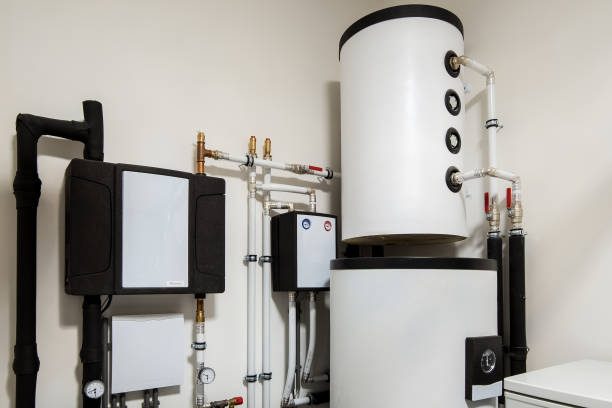Heat Pump Water Heaters in San Diego
Do you need a new water heater in San Diego? Consider converting to a heat pump water heater if this is the case. Heat pumps are used by the majority of homeowners to heat and cool their houses. But a heat pump can also be used to heat water, either independently or in combination with an air conditioning system.
How They Operate
HVAC system Water heaters use energy to move heat from one place to another rather than directly producing it. The energy savings compared to conventional electric resistance water heaters might be as high as two to three times. By functioning as a heat pump in reverse, a refrigerator transfers heat.
Similar to how a refrigerator absorbs heat from inside a box and disperses it into the space around it, a stand-alone air-source heat pump water heater collects heat from the surrounding air and transfers it – at a higher temperature — to heat water in a storage tank. It is possible to buy an integrated stand-alone heat pump water heating system with a built-in water storage tank and backup resistance heating components. A heat pump can also be configured to function with an existing traditional storage water heater.
Heat pump water heaters must be designed with at least 1,000 cubic feet (28.3 cubic meters) of space surrounding them and installed all year long at temperatures between 40°F and 90°F (4.4°C and 32.2°C). Either through the chamber or from the outside, the air that passes through the evaporator can be vented.
Due to the fact that they chill the space in which they are installed, heat pump water heaters are worthless in cold climates. They will function more effectively if installed in a warm space, such as a furnace room.
It is also possible to install an air-source heat pump system that combines heating, cooling, and water heating. These combined systems extract heat from the inside air both in the summer and the winter. Any type of air-source heat pump system performs better in a hot climate because it extracts heat from the air.
Geothermal heat pumps are frequently used by homeowners to heat and cool their homes. In the winter, these appliances draw heat from the earth, while in the summer, they draw it from indoor air. A geothermal heat pump system can be equipped with a desuperheater for water heating. A desuperheater is a small heat exchanger that uses the superheated gases produced by the heat pump’s compressor to heat water. The home’s storage water heater tank is then connected to by a line carrying the hot water.
Tankless or demand-type water heaters also provide the option of desuperheaters. The surplus heat that would often be released to the earth during the summer is used by the desuperheater. If you use the geothermal heat pump frequently throughout the summer, it might be able to meet the majority of your hot water requirements.
You’ll need to rely more on your storage or demand water heater in the fall, winter, and spring when the desuperheater isn’t producing as much excess heat. Some manufacturers also provide geothermal heat pump systems with three functions: heating, cooling, and hot water. They employ a separate heat exchanger to meet all of a household’s hot water requirements.
How to Choose a Heat Pump Heater for Water
The initial cost of heat pump water heaters is typically higher than that of traditional storage water heaters. Their greater purchase and installation costs can be offset by their lower running costs, though.Heat pump water heaters frequently start out more expensive than conventional storage water heaters. However, their lower operating expenses can make up for their higher purchase and installation prices.
You should also think about the following things before purchasing a heat pump water heating system:
- Size and rating for the first hour -Fuel kind and availability
- Overall expenses -Energy efficiency (energy factor)
If you’re thinking about installing an integrated water heating, space heating, and cooling heat pump system in your home, check out our information on air-source heat pumps and geothermal heat pumps.
Maintenance and Installation
With correct installation and upkeep, your heat pump water heating system’s energy efficiency can be increased.
The right installation depends on a variety of criteria. Among these factors are the type of fuel, the environment, the demands of the local building codes, and safety issues. Therefore, it is advised to hire a licensed plumbing and heating contractor (or a geothermal heat pump system installer/designer) to install your heat pump.
When looking for a qualified specialist, keep the following in mind:
- Ask for written cost estimates
- Ask for references
- Check the company with your local Better Business Bureau
- Confirm that the company will seek a local permit if necessary and is familiar with local building codes.
Periodic water heater maintenance can considerably extend the life of your water heater and reduce efficiency loss. Specific maintenance advice can be found in your owner’s manual.
Increasing the effectiveness of energy use
After your water heater has been properly built and maintained, try some additional energy-saving techniques to help reduce your water heating costs. It is more cost-effective to install various energy-saving devices and systems along with the water heater. For all of your plumbing and leak detection needs, call Fraser Plumbing Inc.
Source: https://www.energy.gov/energysaver/heat-pump-water-heaters
Reach out to our plumbing service experts today!
We are fully committed to providing you with the plumbing services that you need in San Diego.

